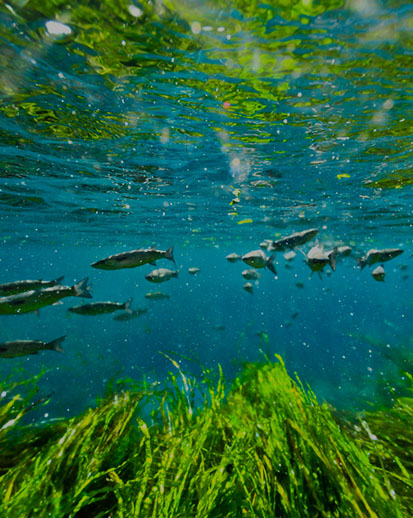Suppliers
Our partnerships and suppliers across the value chain play an essential role in helping us all thrive in ways that benefit People, Planet and Profit. The goal is to develop our business together in an environmentally, economically and socially responsible manner. This is why we expect all our suppliers to act sustainably.
The DSM Sustainable Procurement Program
Our Sustainable Procurement Program comprises the following elements:
- Supplier development and evaluation program, in which we focus on assessing, auditing and further improving our suppliers’ sustainability performance by actively developing and following up on corrective actions
- Our Scope 2 program for reducing greenhouse gas (GHG) emissions from purchased electricity
- Our Scope 3 program for reducing GHG emissions throughout our value chain, where we are working together with our suppliers on our collective carbon footprint and emissions
- A sustainable decarbonization of heat via the procurement of renewable fuels
|
|
2022 |
|
2021 |
||||
|---|---|---|---|---|---|---|---|---|
|
|
|
|
|
||||
Spend coverage SCoC |
|
96% |
|
95% |
||||
EcoVadis assessments |
|
429 |
|
411 |
||||
Together for Sustainability audits |
|
9 |
|
8 |
||||
Spend on local suppliers1 |
|
64% |
|
62% |
||||
|
||||||||
The Supplier Code of Conduct (SCoC) is the foundation of DSM’s Sustainable Procurement Program and outlines the business principles which are most relevant for our supply chain, clustered along the People, Planet, and Profit dimensions. In 2022, more than 96% of our spend was covered by the SCoC, exceeding our 95% target. The SCoC is available on the DSM Supplier website in eight languages.
In addition to our SCoC, DSM invites suppliers to perform an EcoVadis assessment. An EcoVadis assessment measures the quality of the relevant supplier’s sustainability systems through its policies and actions, and results are categorized in four themes: Environment; Labor & Human Rights; Ethics; and Sustainable Procurement. DSM supports suppliers who do not meet our minimum score in defining and executing a corrective action plan. Assessments are valid for three years in the case when the minimum score is met, and for one year when there are gaps between the supplier’s performance and DSM’s norms and values.
Assessing sustainability in our supply chain
Improving sustainability in a complex value chain is challenging. That is why we work together with 39 other companies operating in the Together for Sustainability (TfS) initiative. TfS is an industry-driven collaboration dedicated to building sustainable supply chains through supplier engagement and development as well as continuous improvement efforts. We are active in several workstreams to enhance sustainability, and in 2022, TfS welcomed seven new members. More information about this program can be found on our company website.
Through TfS, we also continued to use virtual audits to further increase transparency regarding supplier sustainability performance. Virtual audits are not suitable for every supplier – for example, for initial audits, due to the absence of physical experiences (such as human interaction and smells). However, we believe that virtual audits are a cost-effective and environmentally friendly method to follow up on initial audits and corrective actions.
When a TfS member invites a supplier for an EcoVadis assessment, the results are shared among all other members, enhancing transparency across the industry. In 2022, value chains were disrupted through the energy crisis, the war in Ukraine, and COVID-19. Despite these factors, TfS members assessed 429 DSM suppliers, of which 385 were reassessments. Sixty-two percent of our supplier base received an improved score, confirming that sustainability development remains a key focus point for all stakeholders.
We are also exploring additional tools to EcoVadis for the purpose of evaluating supplier sustainability performance. Through IntegrityNext, we were able to assess 134 suppliers on environmental, social, and governance performance in 2022.
Capabilities to enhance and drive sustainability
We work with our strategic suppliers to further elevate sustainability. In addition to assessments, audits, and corrective action plans, we also support our employees and suppliers directly through raising awareness and providing training. Given the increasing importance of driving sustainable business, we have mandatory trainings on sustainable procurement, sustainability assessments and audits, and scope 3. Over the course of 2022, we started to revise our internal training material on scope 3. These trainings, together with training on how to coordinate assessments and audits, are mandatory for all DSM employees within the sourcing area. Going forward, DSM also recommends these trainings to a wider target audience, enabling cross-functional teams to support in tackling our scope 3 ambitions. The new online training will be rolled out over the course of 2023.
Additionally, TfS launched the TfS Academy in early 2022. This new online learning platform enables our employees as well as our suppliers to follow 240 online courses in seven languages, covering a broad curriculum ranging from basic education on sustainable procurement to advanced training material on human rights due diligence and developing a scope 3 program. Since the summer of 2022, over 1,000 courses have been completed by TfS members.
When engaging with suppliers on Scope 3 reduction projects and corresponding roadmaps, DSM offers expertise from our own GHG experts to support our suppliers in their own journey to reduce emissions. The suppliers’ scope 1 and 2 emissions directly determine our scope 3 emissions, making this a mutually beneficial learning experience.
Since 2021, the concept of sustainable tender has been included in all strategic sourcing projects within global logistics and packaging. With sustainable tender in the supplier selection process, we will be able to identify sustainable solutions from our suppliers, differentiate suppliers in terms of sustainable behavior, and influence the supply market.
Stakeholder engagement
In addition to working with our suppliers, we also work with external partners to enhance collaboration in the supply chain. These partners include Roundtable for Sustainable Palm Oil (RSPO), Friends of the Sea, and the Marine Stewardship Council.
Taking steps toward deforestation-free supply chains.
We are taking steps to tackle deforestation: in 2021, we committed to create a healthier future for people, planet and livelihoods, through various global Food System Commitments. One of these commitments is to achieve 100% deforestation-free primary supply chains, by 2030 at the latest. This commitment relates to palm derivatives, sugarcane, and direct soy and corn products. For suppliers to prove deforestation-free primary supply chains, we require certifications from not-for-profit organizations such as RSPO, BonSucro, ProTerra, or ISCC. As a member of the RSPO, a not-for-profit, multi-stakeholder organization aimed at making sustainable palm oil the market norm, we aim to have RSPO certification for all of our major production sites that use palm oil derivatives. Through our legal entity DSM Nutritional Products AG, we are a member of RSPO. For more information on our use of palm oil, see the company website.
Responsibly sourced marine resources
Protecting our marine environment is important to us as a company. We are committed to the responsible and sustainable use of natural marine resources. We have ‘Friends of the Sea’ certification for all our fish oil purchases. This helps ensure that the fisheries involved in providing fish oil to produce our omega-3 product range are sustainable. Furthermore, we have had 100% Marine Stewardship Council (MSC) certification for all our tuna oil suppliers since 2020. We are proud to partner with the MSC, the global gold standard for certification and eco-labeling of seafood, to offer MEG-3® tuna DHA oils and powders that are MSC Chain of Custody (CoC)-certified. This certification guarantees ‘ocean-to-purchase’ traceability throughout the entire supply chain, providing assurance that our tuna DHA products can be easily traced to certified fisheries.
The BICEPS Network
The BICEPS Network is a network with shippers and industry bodies to advocate sustainability in the international transport market. It has the aim to reduce CO2 emissions of carriers. In 2022, the Network welcomed new members, and held multiple innovation sessions, with external speakers presenting new innovations in sustainable shipping and workshops to explore cooperating on logistics. The Network created an internationally verified rating system that provides an industry-recognized sustainability ranking of shipping lines and enables us to reward sustainable behavior. We work as much as possible with top-ranked carriers.
Supplier projects
As part of our drive to foster better business through our supplier projects, our Procurement organization engages in proactive dialogue with suppliers to move the business agenda forward. In this context, we pursue initiatives to create joint value, awareness and engagement regarding innovation, greenhouse gas emissions reduction and renewable electricity projects. Over the course of 2022, we continued our engagement with key suppliers through our CO2REDUCE program on reducing the carbon footprint of our most GHG-emitting value streams, jointly developing roadmaps with more than 80 suppliers across our Nutrition business. More information on this program can be found in Scope 3 emissions.
A joint initiative of one of our suppliers and our procurement team in our Health, Nutrition & Care plant in Buk (Poland) replaced all conventional cardboard boxes with FSC-certified packaging. The shift to raw materials originating from responsible forestry, in combination with reduced thickness of the boxes, not only led to a cost saving for our customers, but also made a positive contribution toward maintaining biodiversity.
We are continuously looking for ways to address and assess the impact of our operations in close collaboration with our strategic business partners. Human rights in supply chains is an area that is receiving increased focus from our stakeholders and in legislation around the world. In 2022, we initiated a human rights impact assessment together with Seafoodia, one of our key suppliers in marine resources, to better understand potential and actual human rights risks in our fish oil value chain. As this assessment is performed along the full upstream value chain, transparency and a collaborative approach to engage local stakeholders are required to make this a success. The results will be available in 2023 and will be used to develop future guidance on implementing the UN Guiding Principles. In the event of any actual impacts, a multi-stakeholder approach with Seafoodia will be aligned.
Together with our key suppliers in scientific equipment, we developed a high-end laboratory equipment lease program. Typically, expensive, high-tech lab equipment is purchased and owned for a period of up to 10 years. However, with increasingly rapid advances in technological innovations and improvements, the usefulness and added value of this equipment decreases after only a few years. Leasing now enables us to return the equipment to the supplier and replace it with a newer, updated version, instead of keeping and maintaining the obsolete equipment. This provides our scientists with continued access to the latest and best technology and allows the unused equipment to have a second lease of life.
In Brazil and France, we started utilizing electrical heavyweight trucks for on-site transportation and local distribution. The sourcing process addressed sustainability dimensions alongside the commercial and operational conditions, combined with a longer-term perspective on scalability across Latin America. Besides electric options, we also explored alternative fuels, with HVO (bio-fuel) solutions being implemented in Europe to reduce emissions for customer deliveries.




